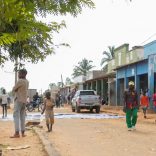Mozambique: At least six insurgents killed in Cabo Delgado
Severe cyclone damage to power supplies- AIM Report

in file CoM
Cyclone Idai, which struck central Mozambique on 14 March, caused serious damage to the Mavuzi and Chicamba power stations which normally supply much of Manica and Sofala provinces with electricity, according to a report on the independent television station STV.
The Mavuzi and Chicamba dams are both on the Revue river in Manica province and are operated by the publicly owned electricity company, EDM.
After surveying the damage, the Deputy Minister of Mineral Resources and Energy, Augusto Fernando, said that production at Chicamba had dropped by 20 megawatts, while the Mavuzi power station is completely paralysed. After rehabilitation of the two dams was completed in 2017, the maximum generating capacity at Chicamba rose from 38 to 44 megawatts, and that at Mavuzi from 30 to 41 megawatts.
Losing generating capacity of over 60 megawatts is a severe blow to the economy of central Mozambique. All of Manica and Sofala is now dependent on power from the Cahora Bassa dam on the Zambezi. Fernando said that, as yet, there is no forecast for the restoration of power from Chicamba and Mavuzi. Furthermore many pylons on the transmission lines were blown down by the storm, in both Manica and Sofala, and it is not yet clear when EDM will be able to repair or replace them.
Fernando estimated the cost of repairs to the Mavuzi and Chicamba systems at six million US dollars. “Right now, our perspective is to mobilise generators, to provide power for basic services, particularly for health units”, he said.
He added that the government is working flat out to try and restore the damaged systems, which have deprived about 6,000 clients of power.
Meanwhile, businesses in Sofala on Thursday took advantage of President Filipe Nyusi’s visit to Beira to demand that the state pay its debts to private companies. The Mozambican state takes a notoriously long time to pay for goods, services and building work, and companies complain that this prejudices their profitability.
Nyusi said this question should be analysed case by case and, if necessary, a commission could be set up to determine whether a business really had provided the goods or services that it claimed. The absence of a document proving that a business arrangement had indeed been struck made payment impossible, he said. Indeed, a state official who authorised payment in the absence of a written document risked going to jail.
The businesses also asked the government to extend the period for payment of corporation tax, normally collected at the end of the first quarter, to the end of the year. They requested a reduction of Value Added Tax (VAT) on the raw materials and building equipment they need to rebuild their damaged undertakings, and exemption from customs duties if this equipment is imported.
Nyusi assured the businesses that the government has considered these issues – however, Mozambique is currently living entirely on revenue collected domestically, and granting tax exemptions could lead to difficulty in the government paying public sector wages. But he admitted that some incentives could be given to business people in the affected areas.
Sofala businesses asked Nyusi to give priority to local businesses in contracts for post-disaster reconstruction. The President replied that this was precisely the government’s policy – but there were cases in which he doubted the capacity of local companies to produce sufficient goods in due time.
It is, for example, urgent to print 700,000 school books to replace those lost in the floods. Were local companies able to handle such a massive printing order?
Nyusi stressed that, to facilitate business, the government is doing all it can to reduce transport and electricity costs. But he expected business to respond by reducing the prices at which it sells goods and services to consumers.












Leave a Reply
Be the First to Comment!
You must be logged in to post a comment.
You must be logged in to post a comment.